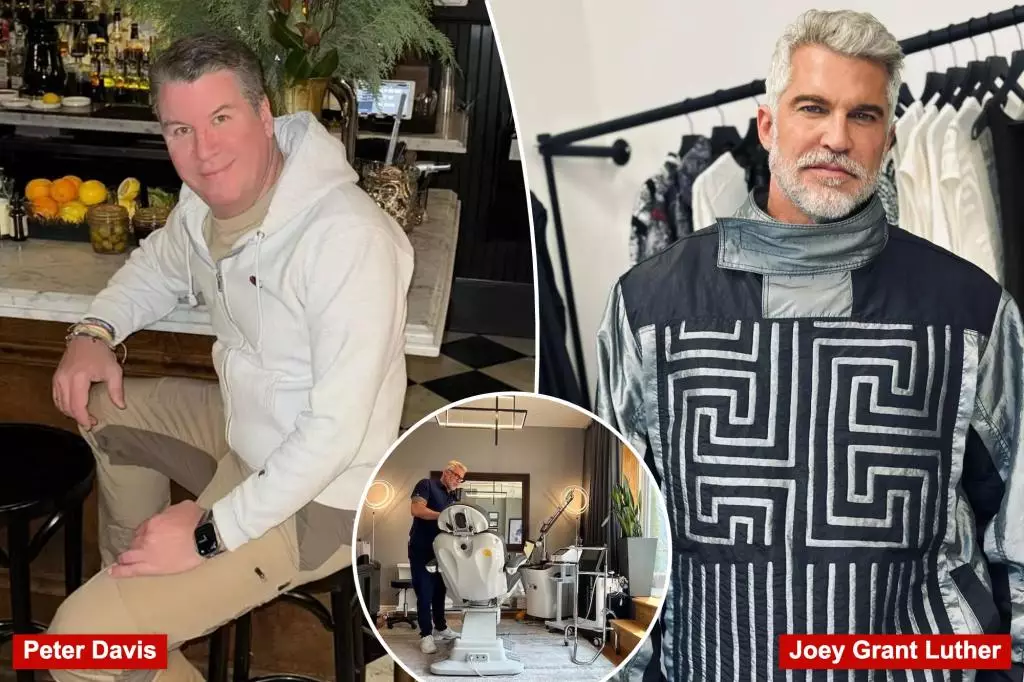In the glitzy world of aesthetic treatments, where the allure of a smooth, youthful visage often overshadows the underlying dangers, the recent case of Joey Grant Luther has sent shockwaves through social circles and the broader community. Luther, an unlicensed practitioner posing as a skin doctor, has been arrested for allegedly administering counterfeit Botox sourced from China. This alarming situation raises critical questions about accountability, education, and safety in the unregulated realms of cosmetic medicine.
As more details of the scandal emerge, it becomes clear that Luther’s operation extended beyond mere malpractice; it spiraled into an emblematic case of deceit within a burgeoning industry. High-profile figures, such as Peter Davis, the editor-in-chief of Avenue magazine, have come forward, sharing their alarming experiences as former clients. Davis amusingly yet uneasily joked about his experience, stating that it is a miracle he still retains his looks despite seeking affordable Botox injections from a less-than-reputable source. This incident may seem ridiculous at first glance, yet it underlines a much graver issue: the urgent need for vigilance in the quest for beauty.
Luther’s practice, which he masqueraded as a high-end medical spa, JGL Aesthetics, preyed on individuals looking for deals on cosmetic procedures. The emphasis on affordability without considering the practitioner’s qualifications reflects a disturbing trend. Many individuals are inclined to overlook the necessity for proper licenses in pursuit of a good bargain. The revelation from Davis that clients, motivated by whisperings of “good deals,” flocked to an unlicensed practitioner encapsulates the cognitive dissonance that frequently occurs in the glow of aesthetic desires.
Additionally, the transformation of an ordinary apartment into a faux medical facility raises serious concerns about both regulatory oversight and consumer awareness. It becomes painfully evident that when desirability meets deception, individuals can easily find themselves ensnared, leading to devastating consequences. For some regular patrons of Luther’s dubious services, the price wasn’t merely financial but laid the foundation for painful physical symptoms, including severe neurological issues.
As the fallout from Luther’s activities continues, a support group that ironically calls themselves the “Former Lutherans” has emerged. These individuals are not just exchanging tales of shock and regret but are actively seeking out authentic, credible practitioners to restore their faith in cosmetic services. The formation of this group highlights how far-reaching Luther’s actions have affected the community, especially within the gay community, which constituted a significant part of his clientele.
Moreover, the dynamics of sharing information amongst former clients are instructive; they point to an urgent need for greater public education about aesthetic treatments and the inherent risks tied to unregulated providers. Clearly, this could potentially avert future tragedies.
The Personal Toll and Institutional Failures
The arrest of Joey Grant Luther not only unveils his dubious practices but raises broader questions about regulatory failures that allow such individuals to operate unchecked. Recent investigations shed light on criminal charges that include wire fraud and the reckless prescribing of counterfeit drugs under the guise of experienced care. The gravity of these infractions becomes evident when juxtaposed with the personal ramifications faced by victims, some of whom were hospitalized due to botulism—a life-threatening condition resulting from improper Botox administration.
The implications, however, stretch beyond individual cases of malpractice. They beckon a profound examination of existing structural weaknesses within the aesthetic medicine sector. If clients must resort to social media groups for recommendations instead of accessing verified medical professionals through established channels, it signals a disconcerting lapse in the overarching systems meant to safeguard public health.
As Joey Grant Luther prepares to face legal consequences for his alleged crimes, it serves as a somber reminder of the potentially disastrous intersection of vanity and negligence. While the allure of youthful appearance can motivate individuals to seek out aesthetic treatments, it is essential to prioritize safety and legitimacy. The importance of thorough research on practitioners and a critical approach to beauty enhancements cannot be overstressed. The tragic outcome of this scandal calls for a new narrative in the aesthetic industry, one that champions informed choices and underscores the necessity of proper regulation. In a society increasingly obsessed with appearance, the stakes have never been higher.

